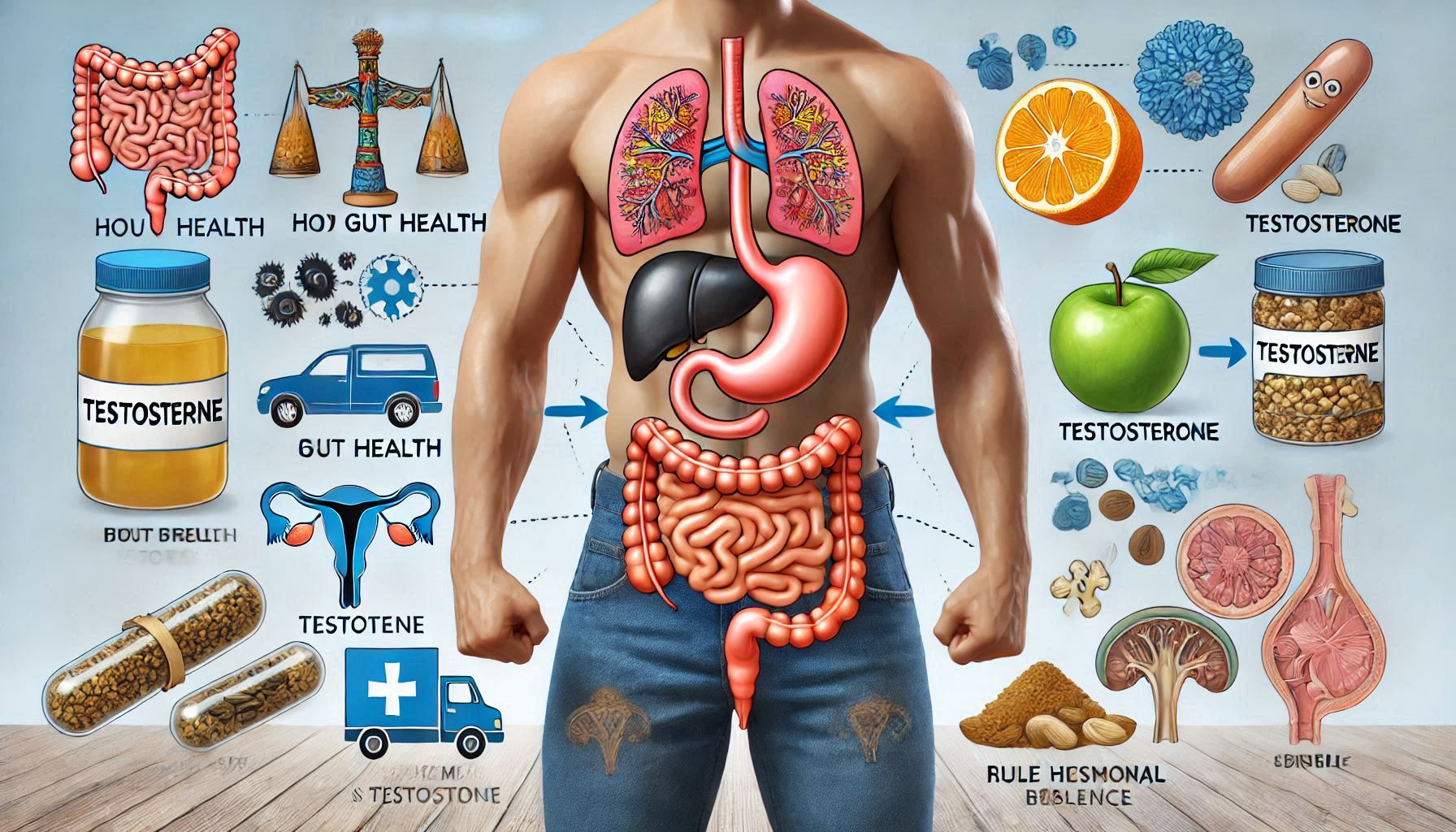The Connection Between Gut Microbiota and Testosterone
In recent years, research has shed light on the critical role of gut health in shaping overall well-being, including hormonal balance in men. The gut microbiota—a community of trillions of microorganisms living in the digestive tract—plays a pivotal role in various bodily functions. Among these functions is the regulation of testosterone, one of the primary male hormones responsible for energy, muscle mass, libido, and mood.
A healthy gut contributes to optimal testosterone levels, while an imbalance in gut bacteria (known as dysbiosis) can lead to hormonal disturbances. Here’s a breakdown of how changes in gut microbiota can influence testosterone and male hormonal health:
- Production of Key Metabolites: Certain gut bacteria produce metabolites like short-chain fatty acids (SCFAs), which play a role in hormone regulation. SCFAs, such as butyrate and acetate, can help support proper testosterone synthesis by reducing inflammation and supporting metabolic health.
- Regulation of Inflammation: Chronic inflammation is detrimental to testosterone production. Beneficial gut bacteria help regulate the immune system and reduce systemic inflammation, creating a conducive environment for healthy hormone levels. Dysbiosis, on the other hand, promotes inflammatory responses that can hinder testosterone production.
- Hormonal Balance via the Gut-Brain Axis: The gut-brain axis refers to the bidirectional communication between the gut and the brain. An unhealthy gut can negatively impact mental health, leading to anxiety, depression, and stress—all of which are associated with lower testosterone levels. Balancing gut microbiota supports mental well-being, which in turn positively influences testosterone production.
Intestinal Permeability and Its Impact on Testosterone
Intestinal permeability, often referred to as “leaky gut,” is a condition where the lining of the intestines becomes compromised. This allows harmful substances such as toxins, bacteria, and undigested food particles to enter the bloodstream. Leaky gut has been linked to inflammation, autoimmune disorders, and hormonal imbalances, including reduced testosterone levels.
How Leaky Gut Affects Testosterone
- Increased Inflammation: When harmful substances leak into the bloodstream, they trigger an immune response, leading to chronic inflammation. This inflammation can interfere with the body’s ability to produce and regulate testosterone effectively.
- Disrupted Hormonal Pathways: Leaky gut can interfere with the hypothalamic-pituitary-gonadal (HPG) axis, which is crucial for testosterone production. Disruptions in this pathway can lead to lower testosterone levels and poor reproductive health.
- Impaired Nutrient Absorption: A compromised gut lining reduces the absorption of essential nutrients like zinc, magnesium, and vitamins D and B6—all of which are critical for testosterone synthesis. Without adequate nutrients, testosterone production can suffer.
Dietary Decisions and Their Role in Hormonal Health
Diet is one of the most influential factors in maintaining gut health, regulating intestinal permeability, and supporting testosterone levels. Making the right dietary choices can enhance both gut function and hormonal balance.
Foods That Support Testosterone and Gut Health
- Fiber-Rich Foods: Fruits, vegetables, legumes, and whole grains promote the growth of beneficial gut bacteria, leading to improved gut health and reduced inflammation.
- Healthy Fats: Avocados, olive oil, fatty fish, and nuts provide omega-3 fatty acids and monounsaturated fats, which are essential for hormone production.
- Fermented Foods: Foods like yogurt, kefir, sauerkraut, and kimchi contain probiotics that support a healthy gut microbiome and help regulate testosterone levels.
- Lean Proteins: Eggs, chicken, and lean beef provide essential amino acids and nutrients like zinc, which support testosterone synthesis.
- Anti-Inflammatory Spices: Turmeric, circumin, resveratrol, berberine, ginger, and garlic can help reduce inflammation and support gut health.
Foods to Avoid for Optimal Hormonal Health
- Processed Foods: High-sugar, high-fat, and highly processed foods can promote dysbiosis and inflammation, negatively impacting testosterone levels.
- Refined Carbohydrates: White bread, pastries, and sugary snacks can lead to blood sugar spikes and increase inflammation.
- Alcohol: Excessive alcohol consumption disrupts gut microbiota, promotes leaky gut, and lowers testosterone levels.
- Trans Fats: Found in fried foods and processed snacks, trans fats can impair hormone production and increase inflammation.
Lifestyle Changes to Improve Gut Health and Testosterone
- Exercise Regularly: Physical activity supports a healthy gut microbiome and boosts testosterone levels. Both strength training and aerobic exercise are beneficial.
- Prioritize Sleep: Poor sleep disrupts the gut microbiome and lowers testosterone levels. Aim for 7-9 hours of quality sleep each night.
- Manage Stress: Chronic stress leads to cortisol production, which negatively affects testosterone and gut health. Stress-reducing activities like meditation, deep breathing, and yoga can help.
- Stay Hydrated: Drinking plenty of water supports digestion, nutrient absorption, and overall gut health.
- Limit Toxin Exposure: Reduce exposure to environmental toxins, heavy metals, and microplastics, as these substances can disrupt gut health and lower testosterone levels.
Supplements for Gut and Hormonal Health
- Probiotics: These supplements introduce beneficial bacteria into the gut, helping to balance the microbiome and support hormone regulation.
- Prebiotics: Found in foods like garlic, onions, and bananas, prebiotics feed beneficial gut bacteria.
- Zinc: This mineral is essential for testosterone production and can help repair leaky gut.
- Vitamin D: Supports both immune function and testosterone synthesis.
- L-Glutamine: An amino acid that can help repair the gut lining and reduce intestinal permeability.
Conclusion
The connection between gut health, intestinal permeability, and testosterone is clear. A balanced gut microbiome, an intact intestinal barrier, and healthy dietary decisions are essential for maintaining optimal male hormonal health. By making conscious lifestyle and dietary choices, men can support their gut health and, consequently, boost their testosterone levels. Prioritizing gut health not only improves hormone balance but also enhances overall well-being.
FAQs
-
- How does gut health affect testosterone levels?
A balanced gut microbiome supports hormone production by reducing inflammation and promoting nutrient absorption, both of which are crucial for testosterone synthesis. - What are the symptoms of leaky gut affecting testosterone?
Symptoms include chronic fatigue, inflammation, poor digestion, brain fog, and low libido—all potential signs of low testosterone. - Can diet improve both gut health and testosterone?
Yes. Consuming fiber-rich foods, healthy fats, and fermented foods can improve gut health and support testosterone production. - How does stress impact gut health and testosterone?
Stress disrupts the gut microbiome and increases cortisol levels, which can lower testosterone production. - 5. What supplements support gut health and testosterone?
- How does gut health affect testosterone levels?
Probiotics, prebiotics, zinc, vitamin D, and L-glutamine can help improve gut health and boost testosterone levels.








